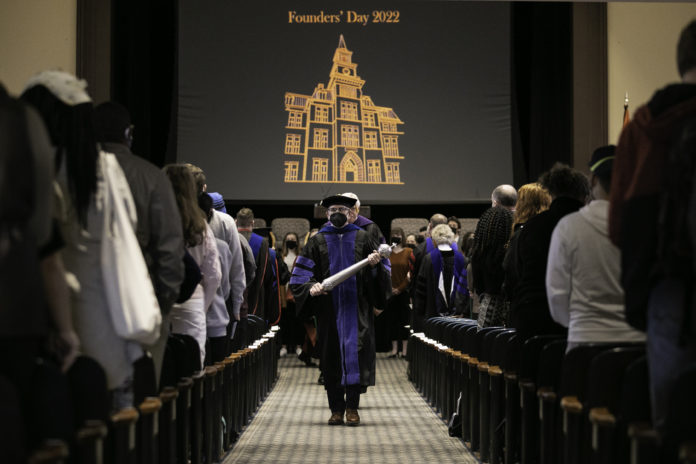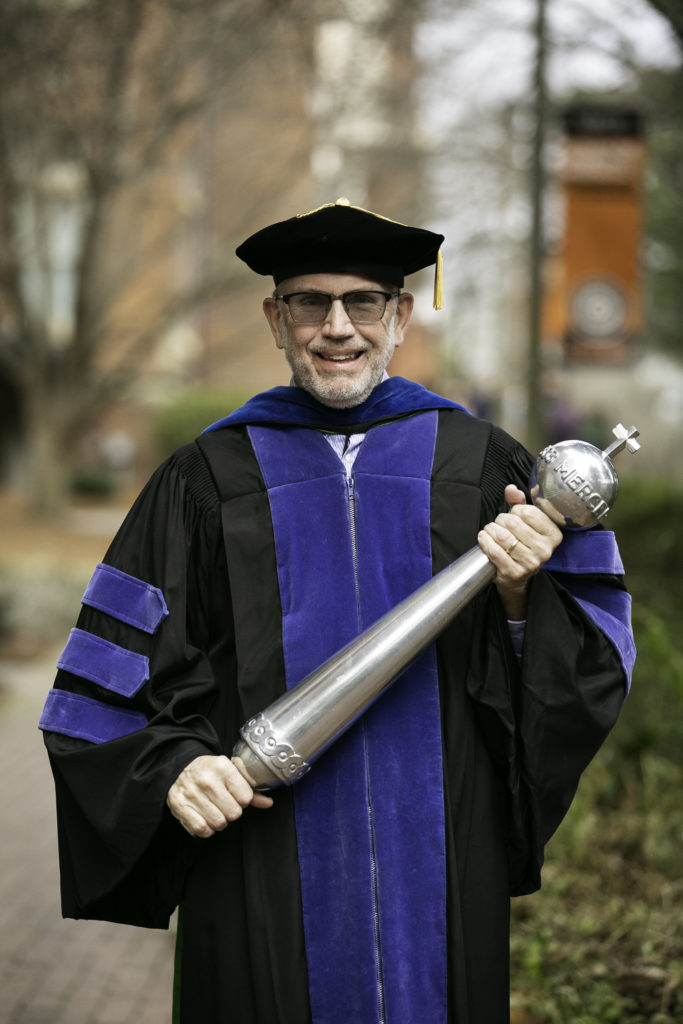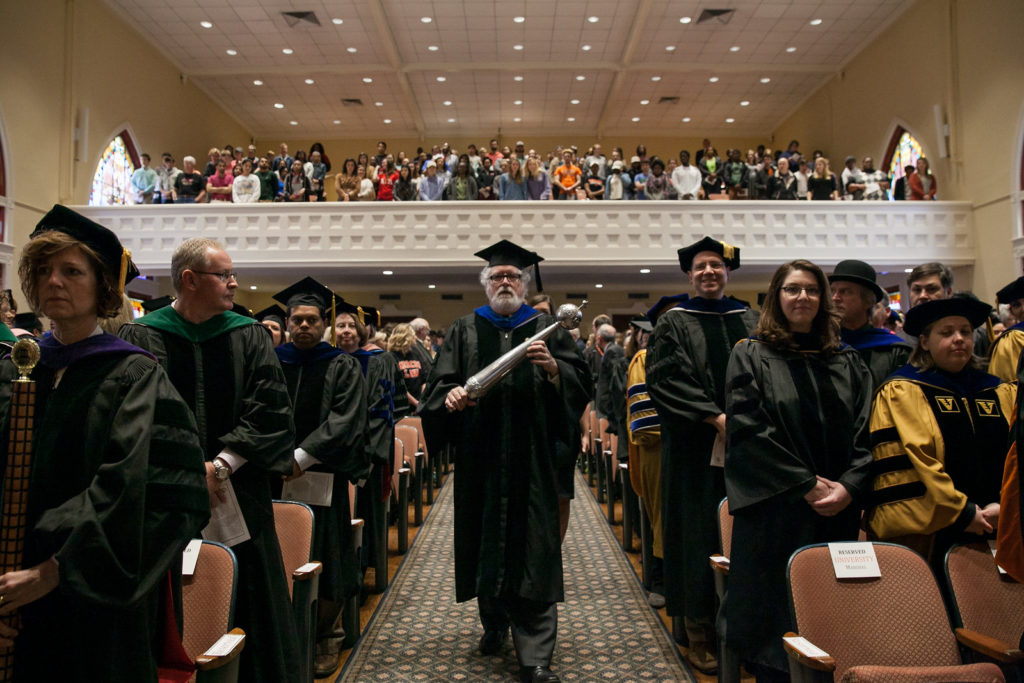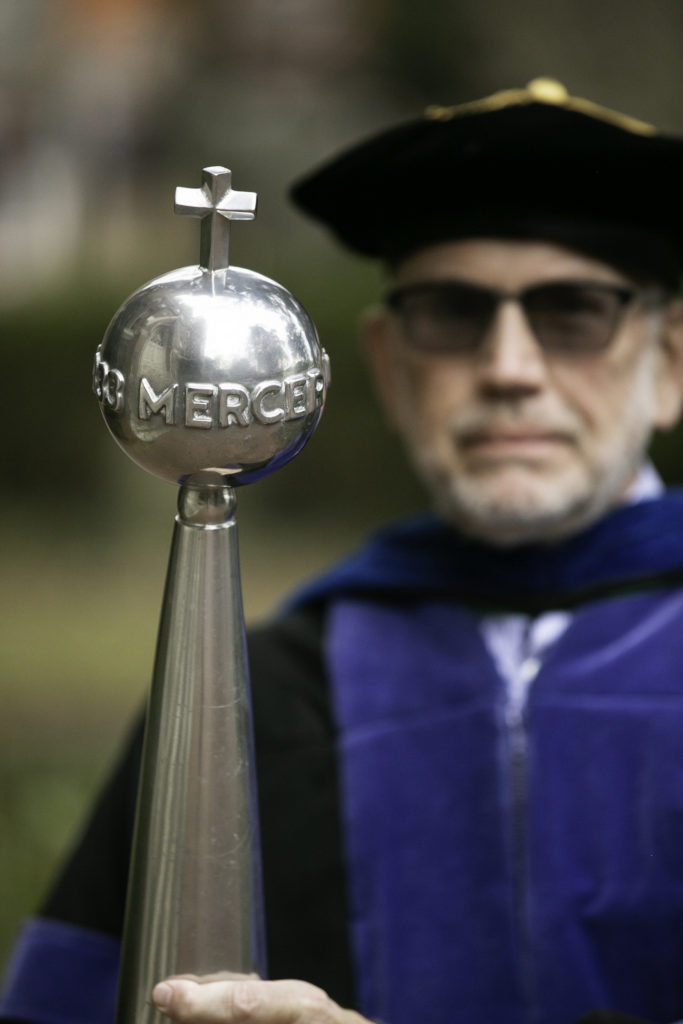
It’s customary for Mercer University faculty and administrators, dressed in their academic regalia, to process into major academic functions like commencement and Founders’ Day. Upon further inspection, one may notice the pack is led by a person carrying the University’s mace, a ceremonial staff made of bronze.
That responsibility falls to the university marshal, a longtime professor chosen to represent all of Mercer’s faculty, and it’s a tradition that dates back at least 68 years.
The marshal
The earliest record of university marshals in Mercer’s library archives is 1954, but the position most likely existed even before then, said Provost Dr. D. Scott Davis. A pair of marshals were chosen for a time, but today, there is one university marshal as well as marshals representing each of Mercer’s schools and colleges, who carry their own unique maces.
Dr. Edwin Johnston and Edgar Wilson are the first Mercer university marshals on record. Others who have served in the role include Dr. James Harrison, Dr. James Crenshaw, Dr. Robert “Bobby” Wilder, Dr. Joseph “Papa Joe” Hendricks, Linda Edwards, Dr. Marjorie Davis, Dr. John Dunaway, Dr. Peter Brown and Dr. Gary Richardson. Dr. Tom Scott is the most recent university marshal, having served in the role since fall 2020.

“The university marshal is a faculty member we hold in very high regard who we think shows a lot of responsibility to our University and our students,” Dr. Davis said. “And as a result, that’s why we let them sort of be the guardian of the academic side of the University and the ceremonies.”
At one point in history, an institution’s university marshal was in charge of organizing, orchestrating and overseeing commencement. But over the course of the 20th century, universities began to hire staff to put on large events, and the university marshal became a strictly ceremonial position, said Dr. Scott, chair of the Department of History and a Mercer faculty member for 31 years.
“To some extent, it’s a recognition of my loyalty to the University, more than 30 years now,” he said. “But also, to me it symbolizes the confidence of the University in me. It’s symbolic, to be sure. There’s no pay involved, and I don’t get any sort of perks or anything, but it’s a sign of confidence from the University’s administration. That’s humbling but also gratifying.”
The university marshal helps coordinate all the school and college marshals, making sure everything runs smoothly and everyone is up to speed on anything that has changed in the ceremonies or process, said Dr. Richardson, who served as university marshal from 2014 until fall 2020 and is retiring at the end of this semester after 38 years in the English department. In addition, this person tells students when it’s time to go on stage, one of the main reasons Dr. Richardson wanted to take on the role.
“It gave me an opportunity at graduation to see all of the majors in my department and congratulate them on completing their degrees,” he said.
The university marshal may serve in the role as long as he or she wishes and typically passes the torch near retirement, said Dr. Davis, who selects the marshal in conference with President William Underwood.
“The university marshal is in some ways a visual connection between the faculty and the student body in situations in which the emphasis is oftentimes on members of administration,” Dr. Richardson said. “It’s a nice reminder for anyone who understands what the marshal is that behind those administrative faces are a host of faculty who are essentially doing the day-to-day work of the University, the teaching, the shared governance work.”

The mace
The mace that the university marshal carries during ceremonies has its own storied chapter. By definition, a mace is a medieval weapon. But over centuries, it lost its weapon status and became a symbol of authority, Dr. Scott said. In relation to commencement, the mace represents a university’s authority to confer degrees, and the university marshal is the figure of authority who leads a university in that task.

It’s interesting to note that the mace is not the only university component with medieval origins; the academic regalia that faculty and administrators wear also date back to that time period, and these elements serve as a reminder of where universities come from, he said.
Mercer’s mace was designed by art professor Marshall Daughtery in 1960 and was first used in the inauguration of President Rufus Harris. It features a cross atop a large globe with the words “Mercer University, 1833” and a smaller globe beneath it. These pieces rest on top of a piece that resembles a spire.
All the elements symbolize the “spiritual commitment of the University as it seeks to understand the world,” the “influence of Mercer throughout the world” and the “microcosm of the University,” according to the description in Mercer’s commencement booklets.
“It’s part of the pomp and circumstance of the academic enterprise,” Dr. Davis said. “I think traditions are important. The university marshal and the mace they carry are a symbol of the 188 years of hard work it took to get to where we are as a University.”









